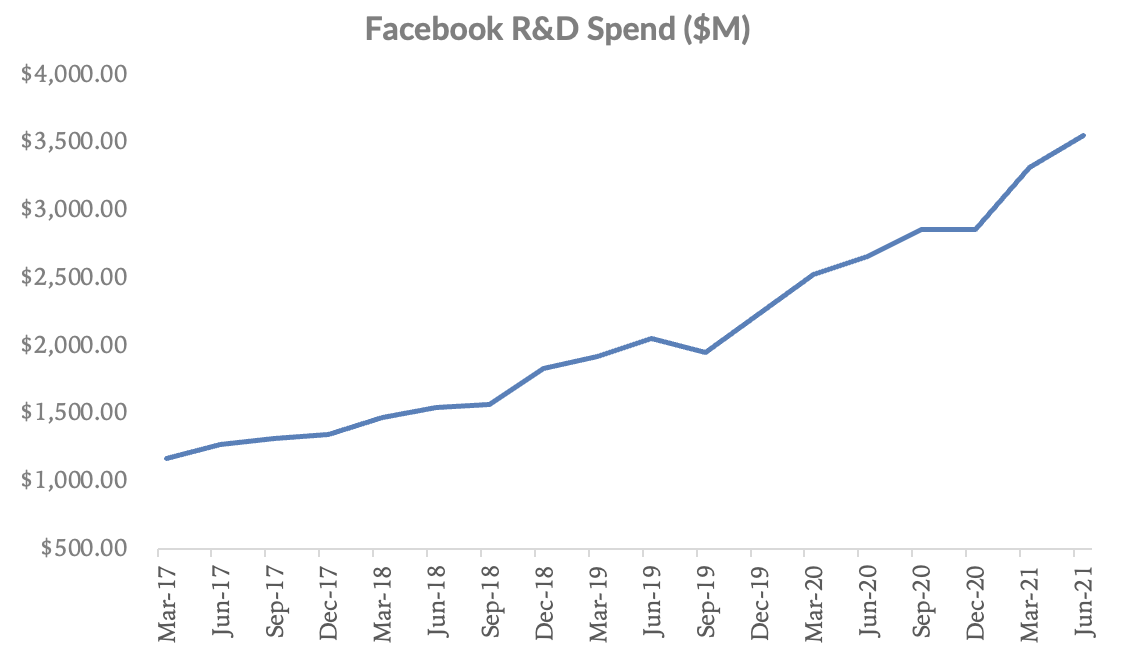Earlier this week, Facebook announced that Andrew Bosworth, the current head of Facebook Reality Labs (hardware and VR division), will become the company’s CTO, reporting directly to Mark Zuckerberg. Bosworth will replace Mike Schroepfer, who is moving to a senior fellow position at the company. The announcement is yet another confirmatory point that Facebook is laser-focused on its ambitions around hardware, AR/VR, and the Metaverse. Despite the clear focus, the long-term success of this ambition is less clear. Facebook’s core competency today is building addicting social products. While social will be a large part of the Metaverse, Facebook will also need to build an integrated hardware+software+services experience, something that is much easier said than done.
Facebook’s commitment to the Metaverse
Facebook’s commitment to creating the building blocks of the Metaverse is undeniable, as evidenced by the company’s investment in its Reality Labs division. According to a report from the Information, roughly 20%, or 10,000 people, of Facebook’s total team is employed at Reality Labs, up from about 5% in 2017. The company’s sharper R&D spend trajectory mirrors this ramp over the past three years:
Facebook’s Reality Labs investments are not just on paper, they’re beginning to materialize in the real world:
- Oculus Quest 2 is the most popular consumer VR headset on the market. In July, it was reported that the Quest 2 had shipped over 4 million units since its release in October. To put this number in context, the Xbox One sold about 10 million units in its first year and the PlayStation 4 sold about 15 million units (Xbox Series X and PlayStation 5 launch numbers are heavily impacted by the current supply chain issues). Oculus is best-positioned to become the go-to VR gaming device, as its early success of reaching 33-50% of the unit sales of consoles within the first year is encouraging.
- The company recently released its Ray-Ban Stories glasses, which allow users to take photos and record videos. These glasses will build the brand and gain key learnings for the company ahead of its big-bet launch of full AR glasses in the coming years. By partnering with Ray-Bans, Facebook is able to address brand concerns while taking advantage of Luxottica’s eyewear category leadership and lens technology.
Facebook’s financial success in the Metaverse unclear
While Facebook is one of the leading hardware supplies in AR/VR headsets today, the company’s financial success likely won’t be based on hardware revenue. Facebook has a greater opportunity to monetize around social, the core competency of the company. Facebook’s current efforts in hardware are likely to motivate other hardware suppliers and help build an initial market. Over time, we think Apple, Google, and Microsoft will be the primary hardware suppliers to access the Metaverse.
The innovation opportunity
About every decade we believe companies need to reinvent themselves to address large new markets and satisfy investors for the long term. For a company the size of Facebook, with an expected $150B in revenue next year, maintaining growth requires a massive, greenfield opportunity. Similar to transportation and AR for Apple, we believe the Metaverse is a sufficiently large opportunity for a company the size of Facebook to chase. Despite the recent hype (thanks to Zuckerberg), the Metaverse remains Facebook’s most potent and underappreciated innovation opportunity.

